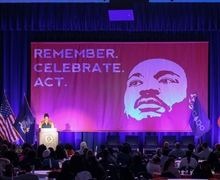SA will host Mental Health Awareness week among pandemic, hate crimes
Siena Pennington | Contributing Photographer
With events taking place both in-person and online, SA hopes to reach more of SU’s student population, whether they’re at home or on campus this fall.
The Daily Orange is a nonprofit newsroom that receives no funding from Syracuse University. Consider donating today to support our mission.
Syracuse University’s Student Association will host its annual Mental Health Awareness Week this fall with both virtual and in-person events.
The coronavirus pandemic and the nationwide reckoning over racial justice have led to an impending mental health crisis, said SA President Justine Hastings. Through several resources and events, SA hopes to help meet students’ increased mental health needs this semester.
“Mental health awareness has always been important,” Hastings said. “But it is especially crucial now due to the consequences of the COVID-19 pandemic and the rise of hate crimes in our country.”
Mental Health Awareness Week will take place in October. Each day will have a theme that represents a different aspect of mental health, including self-care, healthy eating habits and the relationship between mental health and the arts.
With events taking place both in-person and online, SA hopes to reach more of SU’s student population, whether they’re at home or on campus this fall, said Ryan Golden, SA vice president and Hastings.
Hastings wants to emphasize “mental health for the marginalized” because it’s often an issue ignored in mental health discussions, she said.
“I wanted to talk about the intersections of mental health when it comes to race, gender and class,” Hastings said. “I’m not really trying to highlight any specific communities because I feel like there’s just so, so many.”
SA would like to collaborate on events with different faculty and administrators, including Syeisha Byrd, the director of the office of engagement programs at Hendricks Chapel. With faculty support, SA is hoping that Mental Health Awareness Week will reach all populations across campus, Hastings said.
SA is also partnering with Listeners on Call, an organization that matches students with “trained listeners” to help them through whatever they may be struggling with. Students can submit an audio recording to the organization, and the listeners –– who are trained on how to handle different types of calls — begin a dialogue with the student.
While Listeners on Call doesn’t qualify as professional psychiatric counseling, it may be helpful for students to talk to a trained listener anonymously, Hastings said. Listeners on Call provides students with a possible solution before Mental Health Awareness Week begins so those who need help don’t have to wait, she said.
SA has posted several other resources, such as mental health hotlines and financial support options, on its website. The association also plans to utilize resources available through the Barnes Center at The Arch, such as counseling, group therapy and nutrition services.
“By hosting SA’s annual Mental Health Awareness Week, we are dedicated to having conversations about mental health and combating the stigma around it,” Hastings said.
Published on August 23, 2020 at 10:52 pm
Contact Alexandra: azpollac@syr.edu






